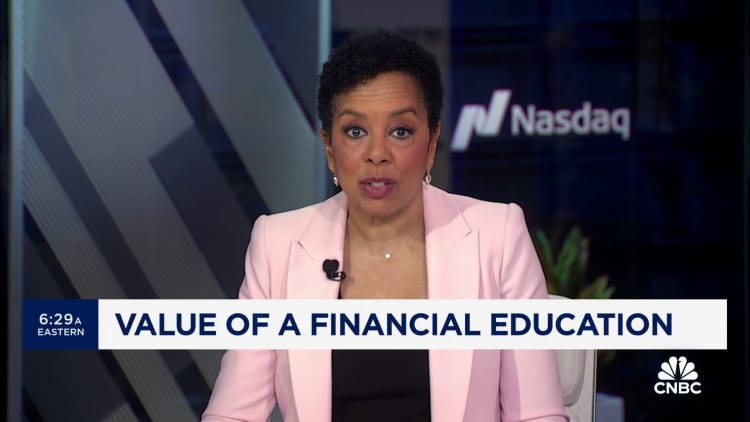Hill Road Studios | Getty Photos
Keith Harris, a 17-year-old highschool senior at KIPP DC College Preparatory, has studied accounting, investing and budgeting, amongst different fundamental classes, like his English, historical past and math curriculum.
Harris is enrolled in his highschool’s NAF Academy of Business, a rigorous three-year finance program with a work-based studying part.
As a result of Harris, who lives together with his aunt, acquired a full scholarship to college subsequent fall, he is additionally in a position to set a few of his part-time earnings apart and make investments these funds.
“Via this system I developed a number of expertise, akin to managing my funds and investing in shares,” Harris mentioned. “It laid down a great basis for me.”
Extra from Private Finance:
Number of millennial 401(k) millionaires jumps 400%
Biden ends some student loan forgiveness plans
Why the ‘great resignation’ became the ‘great stay’
Not like different one-semester highschool private finance programs throughout the nation, greater than 160 college students enrolled within the KIPP DC School Preparatory’s NAF Academy of Enterprise program examine budgeting, saving, investing and managing danger, in addition to different matters, proper by way of commencement. Some obtain NAFTrack certification, a credential that demonstrates a excessive customary of school and profession readiness.
Many college students additionally select to enroll within the First Generation Investors program, the place they will full capstone tasks whereas being tutored by college students from Georgetown College’s McDonough Faculty of Enterprise.
Moreover, internship alternatives pair college students with close by employers, together with Ernst & Younger, the Navy Federal Credit score Union and Verizon.
This system is paid for, partly, by way of federal and native funding and administered by the DC Workplace of the State Superintendent of Training.

The purpose of this system, in keeping with Shavar Jeffries, chief govt officer of the the non-profit KIPP Basis, is “breaking cycles of poverty.”
KIPP DC School Prep caters to an underserved inhabitants of teenagers, and but 100% of the senior class are accepted into a minimum of one school, Jeffries famous, which is essentially per final 12 months’s numbers.
“Financial safety must be a key a part of it,” Jeffries mentioned. “We have now too many younger individuals who do not have the data base to make sensible monetary selections. After we can add that worth and college students deliver these classes dwelling, that can also be very highly effective.”
Donyae Vaughan, 18, a senior at KIPP DC School Prep, will graduate this spring with a lot of monetary lessons underneath her belt, together with Accounting 1 and a couple of. She additionally landed a summer season internship at consulting agency Accenture.
“Most individuals my age do not get to find out about these items,” she mentioned.
Vaughan, who has plans to attend dental college, mentioned the coursework compliments what she has been taught at dwelling. “My household is massive on saving,” she mentioned.
“Final 12 months we realized lots about investments, financial savings and shares and the way we are able to develop our cash,” she mentioned. “Each time I study one thing new, I’d go dwelling and discuss it with my mother.”
Vaughan mentioned she additionally realized concerning the benefit of locking in a top-yielding certificate of deposit by way of this system.
A pattern towards in-school finance lessons
“The three years is a degree of strong programming we do not usually see,” mentioned Raven Newberry, managing director of coverage on the Nationwide Endowment for Monetary Training.
As of 2024, about half of all states require or are within the technique of requiring highschool college students to take a minimum of one monetary literacy course earlier than they graduate, in keeping with the newest knowledge from Next Gen Personal Finance, a nonprofit centered on offering monetary schooling to center and highschool college students.
Though some faculties and college districts have required college students obtain some monetary schooling even with no state mandate, it’s the faculties that serve college students from decrease socio-economic backgrounds that are inclined to fall quick in monetary schooling choices, in keeping with Newberry.
“When a state requires it, that helps shut that hole,” she mentioned.
Monetary literacy results in monetary wellbeing
As well as, a 2018 report by the Brookings Institution discovered that teenage monetary literacy is positively correlated with asset accumulation and net worth by age 25.
Amongst adults, these with better monetary literacy find it easier to make ends meet in a typical month, usually tend to make mortgage funds in full and on time and fewer prone to be constrained by debt or be thought-about financially fragile.
They’re additionally extra prone to save and plan for retirement, in keeping with knowledge from the TIAA Institute-GFLEC Personal Finance Index primarily based on analysis collected yearly since 2017.




























